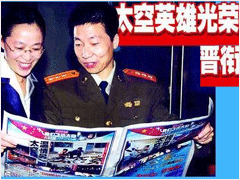
China's first astronaut Yang Liwei, who returned to Earth on
Oct. 16 after a historic manned space mission, has been promoted to
the rank of full colonel, the Beijing Youth Daily reported
on Sunday.
His promotion was not announced in public by the Astronaut Team
of People's Liberation Army, the country's armed forces, although
the promotion decision was made well before his space mission, the
newspaper said.
The promotion decision was made for his excellent performance as
a member of the team during recent years.
His superiors decided not to inform Yang of the decision as they
thought it might affect his mood as the manned space mission was
approaching.
In the picture published in the Sunday's edition of the
newspaper, Yang was shown in a military uniform with three stars on
each shoulder board, one star more than that for his previous rank
of lieutenant colonel.
Yang, 38, became an instant hero in China after he landed safely
from his 21 hour spaceflight, which began on Oct. 15.
Soon after the landing, Yang was flown to the Beijing's Space
City, where he works and lives much of the time. Medical checks at
the landing site and later in Beijing passed him as perfectly
fit.
Born to a family of teachers in 1965 in Suizhong County,
northeast China's Liaoning Province, then the country's leading
industrial center, Yang had a happy and tranquil childhood.
He was intelligent as a child and a good team leader of his
playmates, his parents recalled.
Yang won many prizes in maths competitions.
In 1983, Yang was recruited by the No. 8 Aviation College of the
Air Force of the People's Liberation Army (PLA) and became a
fighter pilot after graduating with a bachelor's degree. He was a
straight A student in every subject during his four year
training.
He became an attack aircraft pilot in the air force, and he was
rated the elite of his air force division.
As a fighter pilot, Yang had 1,350 hours of flight experience.
He was chosen, with 13 others, from among 1,500 pilots for space
flight training.
Yang passed China's stringent astronaut selection tests in 1996
and 1997 with excellent physical condition, including low oxygen
resistance capability in aircraft 10,000 meters above the
ground.
During the first two years of training as an astronaut, Yang
said he never went to bed before midnight in order to be the
best.
As China's first manned space launch drew closer, Yang was among
the three finalists chosen for the maiden voyage.
In order to familiarize himself with sophisticated operations,
Yang put all the charts on facilities inside the capsule on the
wall in his dormitory.
He also video-taped the equipment and structure of the capsule,
and recorded the footage on a video compact disk on its own so that
he could watch it in his spare time.
During the last professional technical tests, Yang did
identified and remedied all the "faults" his instructors had set
up.
His instructor would ask him after each test whether he had made
any operational errors, and he always answered confidently, "No
errors at all".
During five tests of normal flight procedures, he got 99 scores
out of 100 in two and full scores in three tests.
Su Shuangning, director-general and chief designer of the
astronaut system under China's manned space program, described Yang
as a sober-minded person with a "superb capability for
self-control".
(Xinhua News Agency October 20, 2003)

